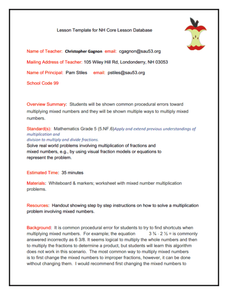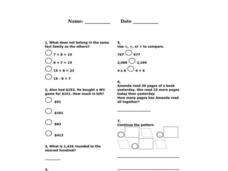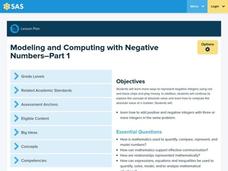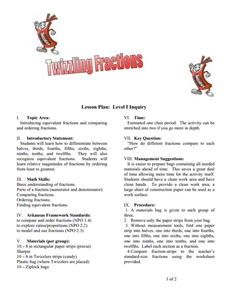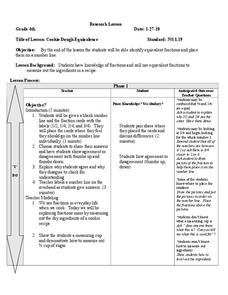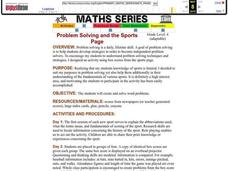Pennsylvania Department of Education
Using the Number Line to Compare
Students determine differences using a number line. In this math lesson, students use the number line to solve subtraction problems. Students solve puzzles using subtraction.
Curated OER
Multiplying Mixed Numbers
In this multiplying mixed numbers worksheet, students with a partner problem solve and calculate the answers to ten word problems and mathematical equations.
Curated OER
Learning Numbers
Students draw circles according to the number that they see. In this counting lesson plan, students have to draw the amount of circles that represent the numbers they see.
Curated OER
Math Review
In this math review worksheet, students respond to 16 questions that serve as a review of fractions, decimals, patterns, number sense, properties, story problems, and computation.
Curated OER
Worksheet, Chapter 1: College Prep Algebra (Integers, Rational Numbers)
In this algebra worksheet, students evaluate equations, identify the inverse of numbers, translate words into a number sentence, compare expressions, and solve radicals. This six page worksheet contains a variety of 67 problems.
Curated OER
Lesson 2 Ordering Numbers
Math wizards begin the lesson by comparing and ordering rational numbers. Using a number line, they discover the relationship between the numbers and practice ordering them in the correct way. They also review proper techniques for...
Curated OER
Decimal War
Pupils play a math game. In this decimals and fractions activity, they use base ten blocks to practice converting between decimals and fractions. Everyone plays a game called Decimal War to practice these concepts.
Curated OER
Fraction and Decimal Ordering
Ordering numbers just got physical! Learners practice putting numbers in sequence, both in fraction and decimal form. To begin, they line up in birthday order and discuss the difference between ascending and descending. They are then...
Curated OER
Relating Fractions and Decimals
Sixth graders identify how fractions and decimals both illustrate parts of a whole. They estimate which number is greater by comparing them to the given fraction and use greater than or less than symbols for each.
Curated OER
Dividing with Fractions
Use paper strips or models to relate division problems to division of fraction problems. Since the materials can be broken up, it helps them to show how they can complete repeated subtraction with fractions and not just whole numbers.
Curated OER
Reading, Writing, and Ordering Numbers
Students study place value. Students participate in place value and number relay games, write numbers in words, and discuss how numbers are read. As a class, they discuss the meaning of less than and grater than signs. Students use...
Curated OER
Estimating Solutions to Word Problems
Learners use estimation to determine the answers to word problems by rounding whole numbers. In this estimation lesson plan, pupils compare and contrast solutions using the best answer.
University of Arkansas
Twizzling Fractions
Using food as a manipulative is one of the best ways to incorporate hands-on learning in the classroom. This hands-on approach allows young mathematicians to compare, order, and identify fractions with the use of Twizzlers® and fraction...
Curated OER
Estimating Solutions
Finding approximate solutions to word problems allows users to assess the reasonableness of their answers. In a well-paced lesson, the class rounds numbers to estimate the solutions. They explain their thinking and determine if the...
Virginia Department of Education
Numbers in a Name
What's in a name? Pupils create a data set from the number of letters in the names of classmates. Each group then takes the data and creates a visual representation, such as a histogram, circle graph, stem-and-leaf plot, etc.
Curated OER
Fraction City
Learners calculate equivalent fractions, solve the addition of fractions of like and unlike denominators, and compare fractions using fraction strips. They fold paper strips into equal parts, thirds, sixths, ninths, and twelfths, and...
Curated OER
Equal or Not Equal
Tiny mathematicians count the number of shapes (up to 8) in pairs of object groups and identify the sets as equal or not equal. Five practice problems. They also draw 2 groups of shapes that are not equal. A focused tool that requires...
Pennsylvania Department of Education
Fractional Parts Using an Area Model
Learners explore multiplying fractions and their relationship to parts of a whole. They draw and shade fractional parts to show parts of a whole and fractional parts of a fraction. Pupils also use an Internet site for interactive practice.
Curated OER
Great Shapes Alive!
Compare two- and three-dimensional shapes and construct three dimensional models from two-dimensional shapes. Diagram the shapes and reflect about the process in writing.
Curated OER
100th Day Celebration
Students celebrate the 100th day of school with a variety of math and language arts activities based on the number 100. They make books, count objects, and draw their predictions about life 100 years from now. They also estimate the time...
Alabama Learning Exchange
Swim the Open Sea: Analyzing Duel Vectors
This dual vector lesson has the class watch a video about a person's swim of the English Channel. The class then uses a computer program to analyze dual vectors of wind's effect on a flight path of a plane as compared to the water...
Curated OER
Cookie Dough Equivalence
Who doesn't love cookies? In this lesson, learners follow a recipe to make cookies, practicing their ability to compare fractions as they go. This is a wonderful way to motivate your class to practice this important skill.
Curated OER
Word Problems Solved By S.M.S.
Learners solve word problems with a consumer math emphasis. This lesson plan also contains many strategies and questions learners can ask to solving problems. There is also a bibliography included for resources on problem solving.
Curated OER
Problem Solving and the Sports Page
The use of box scores from baseball games is the foundation of this math instructional activity. Organize your class into groups of four, and give identical box scores from a baseball game that was just played. Have them create word...



